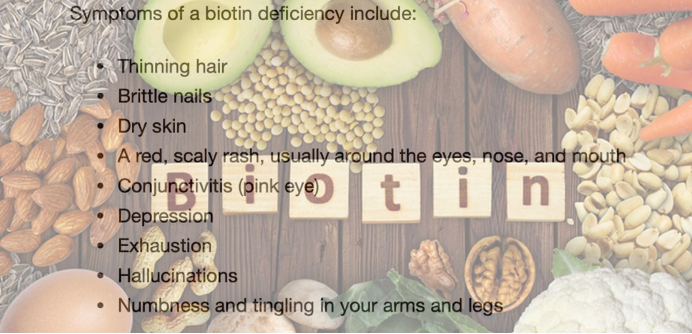Biotin (vitamin H or vitamin B7) is a B vitamin that serves as an essential coenzyme for five carboxylases: pyruvate carboxylase, 3-methylcrotonyl-CoA carboxylase, propionyl-CoA carboxylase, and acetyl-CoA carboxylase 1 and 2. These carboxylases help several chemical processes in the cell, including gluconeogenesis, amino acid metabolism, and fatty acid synthesis. Mammals obtain biotin from food. Foods rich in biotin are egg yolks, liver, cereals (wheat, oats), vegetables (spinach, mushrooms), and rice. Dairy products and breast milk also contain biotin. Additionally, biotin can be produced by intestinal microorganisms.
The Food and Nutrition Board of the Institute of Medicine recommends 30 micrograms per day from the diet to maintain good health. Biotin deficiency is very rare in those who consume a normal, balanced diet.
Lack of adequate environmental supplies or abnormal processing of the vitamin within intracellular pathways can lead to vitamin deficiencies. Biotin is an essential vitamin that is obtained through the diet and efficiently recycled for further use. When this recycling mechanism fails to work due to an enzyme deficiency, patients experience significant morbidity and mortality. This condition, known as biotinidase deficiency, is inherited in an autosomal recessive fashion. Biotinidase deficiency has different clinical manifestations, affecting the dermatologic, ophthalmologic, neurologic, and immunologic systems. Early recognition is critical, as expeditious treatment could prevent or minimize clinical damage.

Saleem, F., & Soos, M. P. (2023). Biotin Deficiency. In StatPearls. StatPearls Publishing. [Link]
Saleem, H., & Simpson, B. (2023). Biotinidase Deficiency. In StatPearls. StatPearls Publishing.[Link]
Bistas, K. G., & Tadi, P. (2022). Biotin. In StatPearls. StatPearls Publishing.[Link]
